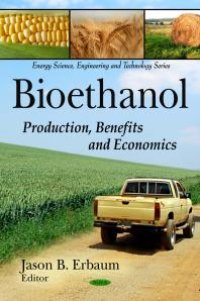
Ebook: Bioethanol: Production, Benefits and Economics : Production, Benefits and Economics
Author: Jason B. Erbaum
- Tags: Alcohol as fuel., Biomass energy., Alcohol as fuel -- Economic aspects., Biomass energy -- Economic aspects.
- Series: Energy Science Engineering and Technology
- Year: 2009
- Publisher: Nova Science Publishers
- City: Hauppauge, United States
- Edition: 1
- Language: English
- pdf
The principle fuel used as a petrol substitute for road transport vehicles is bioethanol. Bioethanol fuel is mainly produced by the sugar fermentation process, although it can also be manufactured by the chemical process of reacting ethylene with steam. The main sources of sugar required to produce ethanol come from fuel or energy crops. These crops are grown specifically for energy use and include corn, maize and wheat crops, waste straw, willow and popular trees, sawdust, reed canary grass, cord grasses, jerusalem artichoke, myscanthus and sorghum plants. Ethanol or ethyl alcohol (C2H5OH) is a clear colourless liquid, it is biodegradable, low in toxicity and causes little environmental pollution if spilt. Ethanol burns to produce carbon dioxide and water. Ethanol is a high octane fuel and has replaced lead as an octane enhancer in petrol. By blending ethanol with gasoline we can also oxygenate the fuel mixture so it burns more completely and reduces polluting emissions. This new and important book gathers the latest research from around the globe in this promising field.
Download the book Bioethanol: Production, Benefits and Economics : Production, Benefits and Economics for free or read online
Continue reading on any device:

Last viewed books
Related books
{related-news}
Comments (0)